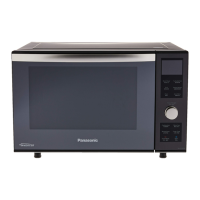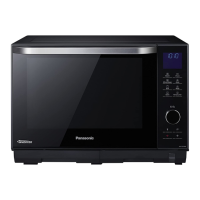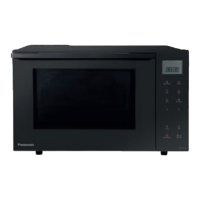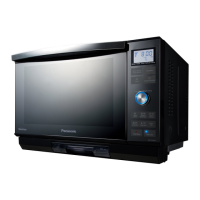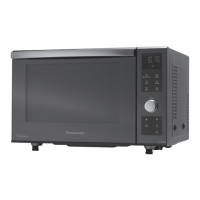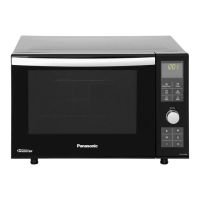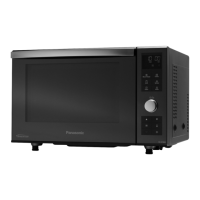General
Use
Food
1 . In order to
maintain
high quality, do not
operate
the oven
when empty. The
microwave energy will reflect
continuously
throughout
the
oven
if no food or water is
present to
absorb
energy.
2. If
a
fire occurs in tlie
oven, touch
the
STOP/RESET Pad
and leave
the door
closed. Disconnect the
power cord,
or
shut off power at the fuse or
circuit
breaker panel.
3.
Do not dry clothes,
newspapers
or other
materials
in oven.
They may
catch on
fire.
4. Do not use recycled paper
products,
as
they may
cental
ri
impurities
which
may
cause
sparks and/or fires when
used.
5. Do not use newspapers or paper bags
for
cooking.
6. Do not hit or strike control panel. Damage to
controls may
occur.
7. POT HOLDERS may be
needed as
heat
from food Is
transferred to the cooking container
and
from
the
container to
the glass tray. The glass tray
can
be
very hot after removing
the cooking container from the
oven.
8. Do not
store
flammable materials next
to,
on
top
of, or in
the oven. It could be a fire hazard.
9. Do not cook food directly on glass tray unless
indicated
in
recipes. (Food
should be
placed
in
a
suitable cooking utensil.)
1
0. Do NOT use this oven to heat
chemicals or other
non-food
products.
Do NOT
clean
this
oven with any product that is
labelled as containing corrosive
chemicals.
The heating
of
corrosive chemicais in this oven may cause microwave
radiation ieaics.
Placement of Oven
1. The
oven
must be
placed on
a
flat, stable surface.
For
correct operation, the oven must have sufficient air flow.
Aiiow 10
cm
of
space at
bacic, 5
cm
on
both
sides
and on
top of oven. Do not remove feet.
a. Do not block air vents. If they are blocked during
operation,
the oven may
overheat.
If
the
oven
overheats,
a thermal
safety device will turn the
oven off. The oven will remain
inoperable until It
has cooled.
b.
Do not
place oven near a hot or damp surface such as a
gas
stove, electric
range
or
sinic
etc.
c.
Do
not operate oven when room humidity is too high.
2.
This oven
was
manufactured for household
use only.
3.
This oven may be
built into
a wall cabinet,
if desired. Trim
kits may be
purchased
from
a
local
Panasonic dealer. See
page 1 5 for technical specifications.
1 . Do not use
your
oven
for home
canning or
the
heating
of
any closed
jar. Pressure
will build
up
and the
jar may
explode.
In
addition, the
microwave
oven
cannot
maintain
the food at
the
correct canning temperature. Improperly
canned food may
spoil and be
dangerous to consume,
2. Do not attempt to deep
fat fry
in your microwave oven.
3. Do not boil eggs in their shell, (unless otherwise stated
in
cookbook
section.) Pressure
will build up and the eggs will
explode.
4. Potatoes,
apples, egg yolks, whole squash and sausages
are examples of foods with
nonporous
skins. This type
of
food
must be
pierced
before
cooking,
to
prevent
bursting.
5. Stir liquids several times during heating to avoid
eruption
of
the
liquid from the container, e.g. water, milk
or milk based
fluids.
6. DO NOT USE A
CONVENTIONAL
MEAT
THERMOMETER iN THE MICROWAVE
OVEN. To
check
the degree of
coolcing
of roasts and
pouitry use a
MiCROWAVE THERMOMETER.
Alternatively,
a
conventional
meat
thermometer may be used after the food is removed
from
the
oven.
If
undercooked, return
meat or
poultry
to
the
oven and cook
for a few more
minutes at the recommended
power level, it
is
important to ensure
that meat and poultry are
thoroughly
cooked. (See the cookbook section for
further
information.)
7. COOKING TIMES given In the
coolcbook section are
APPROXIMATE. Factors that may affect cooking
time are
preferred degree of moisture content, starting temperature,
altitude, volume, size,
shape
of food and utensils used. As
you
become familiar
with the oven, you
will
be
able
to
adjust
for these
factors.
8.
It Is
better
to
UNDERCOOK
RATHER THAN
OVERCOOK
foods. If food is undercooked, it can always be
returned to the
oven
for
further
cooking. If
food Is overcooked, nothing
can be
done. Always start with minimum cooking
times
recommended,
9. Extreme care should be taken when cooking popcorn.
Cook for minimum time
as
recommended by
manufacturer.
Use the directions suitable for the wattage of your
oven.
NEVER leave oven unattended when popping
popcorn.
Circuits
Your microwave oven should be operated on a
separate
230/240
V
10
A
circuits
from
other appliances. Failure to do
this
may
cause
the
power board
fuse
to blow, and/or food to
cook slower. Do not insert
higher value fuse
in
the power
board.
-3-

